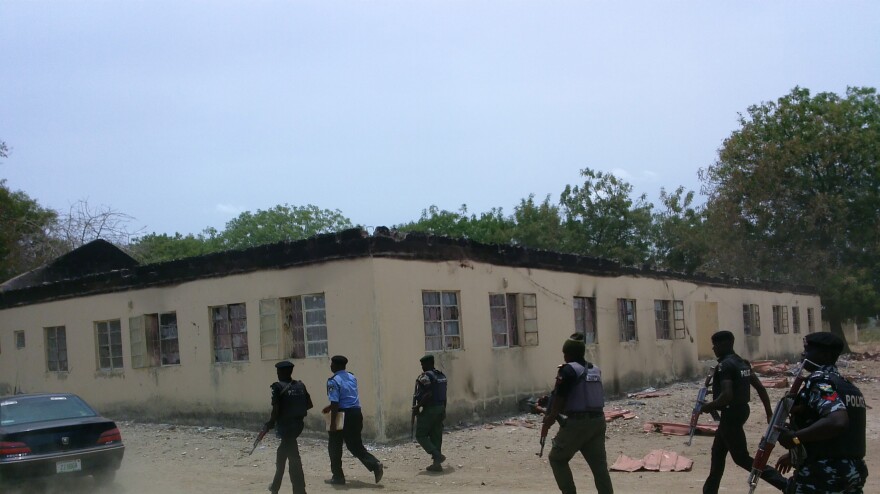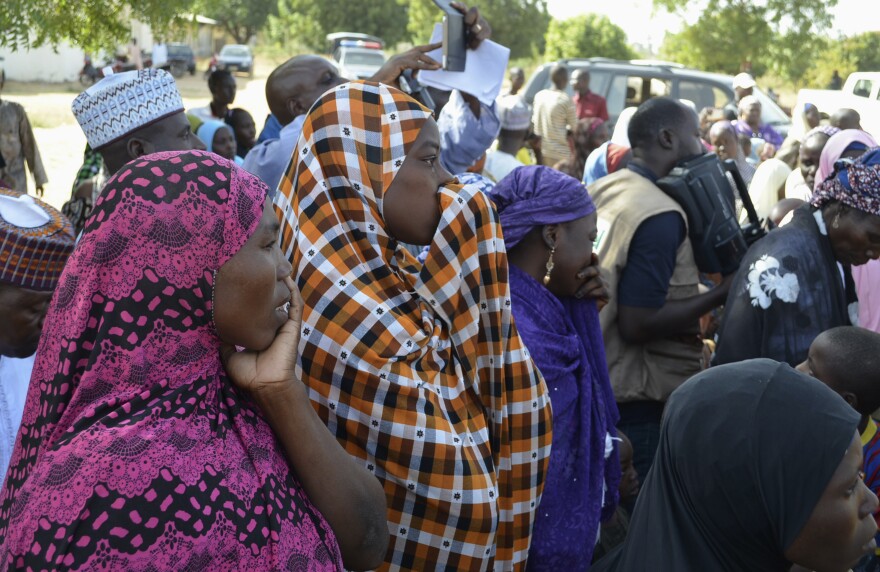There is a grim mood of outrage in Nigeria. In the faraway, northeastern town of Chibok, more than 200 girls were kidnapped from their boarding school dorms in the dead of night nearly two weeks ago.
Chibok is a mixed Christian and Muslim community in predominately Muslim northern Nigeria. The attackers are suspected Islamist extremists. Under pressure, the Nigerian government is vowing to rescue the missing students, but the military is being blamed for failing to free the teens and crush an increasingly deadly insurgency.
The abduction of the Nigerian schoolgirls continues to make headlines and dominate the national conversation. Author Adaobi Tricia Nwaubani says the terrifying incident has struck a nerve across the nation.
"It's a situation of present, continuous agony. Everybody is terrified at the thought of what they might be going through. There's just no reason why these girls could have been targeted. They're so innocent, so harmless," Nwaubani says. "They're probably Muslim and Christian. It's frightening. They're not being seen as Hausa, Yoruba or Igbo [three of Nigeria's major ethnic groups]. They're not being seen as northerners or easterners. They're just seen as children."
The chief suspects in the mass kidnapping are members of the militant Islamist Boko Haram group. The same group claimed responsibility for the deadly bombing on the outskirts of Nigeria's capital, Abuja, earlier this month and just hours before the kidnapping.
In previous raids on schools, Boko Haram, whose name means "Western education is forbidden," has spared girls, ordering them to go home, get married and give up their studies. The sect has vowed to impose strict Islamic law on northern Nigeria and oust the government. The extremists have also been reported to use hostages as sex slaves and cooks in their camps.
Speaking in Hausa and fearing for her safety, a student who asked not to be named told journalists she and other schoolmates at the Government Girls' Secondary School were herded into trucks and driven off by armed men dressed as soldiers. Some girls jumped out and escaped, but nearly 200 are still believed to be held in the remote Sambisa Forest, a dangerous Boko Haram hideout.
Families have pooled together funds for fuel for motorcycles, with fathers, brothers and able-bodied men venturing into the bush in search of the missing girls.
"We, the parents, we are pleading, please leave our daughters," one father, who requested anonymity, told the BBC. "I plead, let the Boko Haram have mercy on our little ones. They are our future."
Families who have been hunting for the missing schoolgirls say they met no Nigerian military in the forest. The army has been roundly condemned for reporting early on that most of the teens had been freed — and then being forced to retract the statement.

Meanwhile, presidential spokesman Reuben Abati defends the government, saying the administration is determined to rescue the girls, but he warns that near-daily air strikes of the rebel forest stronghold — which have been part of the military strategy to date — could endanger the lives of the missing teens.
Nigeria's government faces accusations that it is unable to subdue the terrorist uprising, despite a military offensive and the imposition of emergency rule on three northeastern states almost a year ago.
"The president has never hidden the fact, yes, that this is not just a Nigerian problem, it is also a problem that requires international cooperation," Abati says. "In terms of strategy, in terms of logistics, the presidency and the Nigerian government is, of course, working with the Americans, working with the British, and is also working particularly with neighboring countries."
But Nigerians say enough of presidential promises; they want peace and security now.
Copyright 2020 NPR. To see more, visit https://www.npr.org. 9(MDA4MDYxNjY4MDEzMTQ2OTkxMzkyOWU2NQ004))




